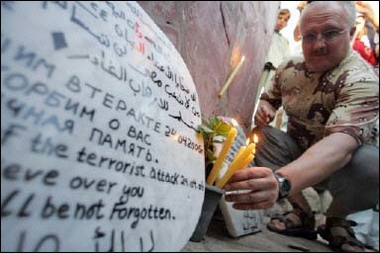Egypt blamed suicide attacks in the Sinai peninsula this week on local
Bedouins linked to an Islamic radical group also responsible for other bloody
bombings in Red Sea resorts in the past 18 months.

A Russian tourist
lights candles next to an anti-terror placard during a memorial ceremony
for the victims of this week's attacks at the scene of the bombings in the
Red Sea resort of Dahab, on the Sinai peninsula, April 26. Egypt blamed
suicide attacks in the Sinai peninsula this week on local Bedouins linked
to an Islamic radical group also responsible for other bloody bombings in
Red Sea resorts in the past 18 months. [AP] |
"The information indicates that the perpetrators of the terrorist attacks
that occurred in Dahab and al-Gura are Sinai bedouins," Adly told state
television late Wednesday.
"They also have connections to previous incidents in Taba and Sharm
el-Sheikh," the minister said after five suicide bombers struck within 48 hours
in the peninsula.
Three suicide bombers struck almost simultaneously in the heart of the
popular Red Sea resort of Dahab on Monday, killing at least 18 people and
wounding up to 80.
On Wednesday, two suicide bombers targeted security personnel from the
Multinational Force and Observers and Egyptian police further north in the
Sinai, causing no injuries.
Security officials and state-owned newspapers had said investigators believed
the attacks were perpetrated by Bedouins from northern Sinai, which is where the
MFO is stationed, close to 400 kilometres (250 miles) north of Dahab.
Egypt accuses a group called Tawhid wal Jihad (Unification and holy war) of
carrying out the July 2005 Sharm el-Sheikh attacks that killed some 70 people
and multiple bombings further up the coast that left 34 dead in October 2004.
Tawhid wal Jihad was the name of Islamic extremist Abu Musab al-Zarqawi's
organisation before it was renamed Al-Qaeda in Iraq in late 2004.
Adly said security reinforcements were dispatched to Sinai, a vast desert and
mountainous expanse inhabited mainly by Bedouin tribes.
Previous attacks in Sinai were followed by tough crackdowns and thousands of
arrests in the peninsula.
The Dahab attacks came a day before Sinai Liberation Day, a public holiday
which celebrates Israel's 1982 withdrawal from the peninsula, in what many
analysts saw as evidence that the perpetrators were from a local group with an
Egyptian agenda.
The Sharm el-Sheikh and October 2004 attacks also were timed to coincide with
key dates in Egyptian history.
The most common hypothesis put forward by security experts and commentators
is that of a new home-grown Islamist cell, that could be an Al-Qaeda "franchise"
without necessarily receiving direct support from Osama bin Laden's network.
Preliminary findings from the investigation revealed that the bombs used in
the Dahab attacks were rudimentary and made with materials locally available.
However, the top-selling state-owned daily Al-Ahram quoted security sources
as saying that the same group responsible for the Sinai bombings were planning
attacks against Israelis and Americans in Iraq.
Investigators have been running DNA tests to match body parts with ID cards
found on the scene of some of the explosions.
In other developments, security sources and witnesses said that unidentified
individuals attacked Wednesday a police post in Belbeis, northeast of Cairo,
causing no injuries.
However, the interior ministry issued a statement denying the incident had
happened.
The Qatar-based Al-Jazeera satellite news network also carried the report and
its Cairo correspondent was later arrested in Dahab. Hussein Abdel Ghani was due
to be questioned in Cairo on Thursday.